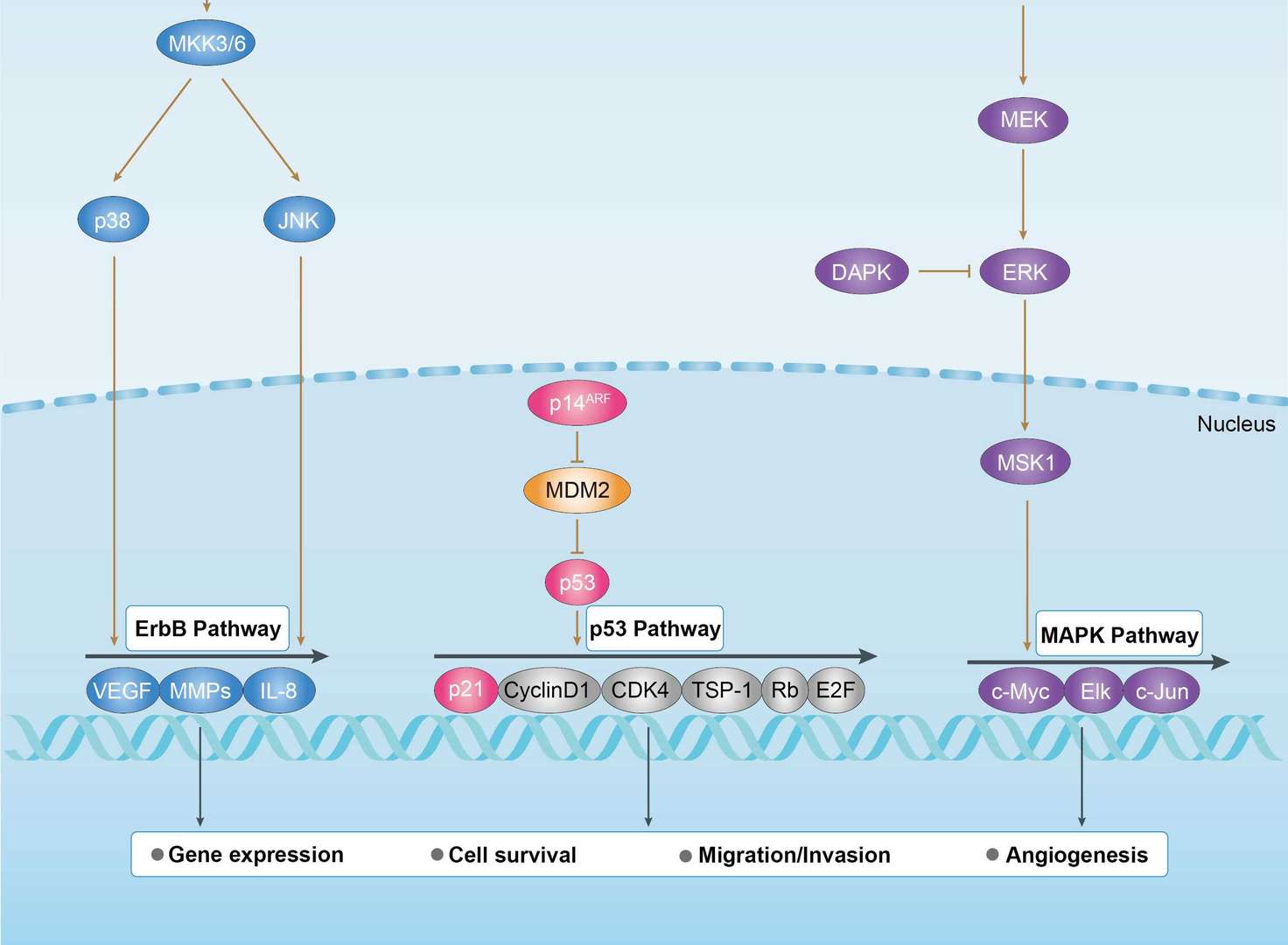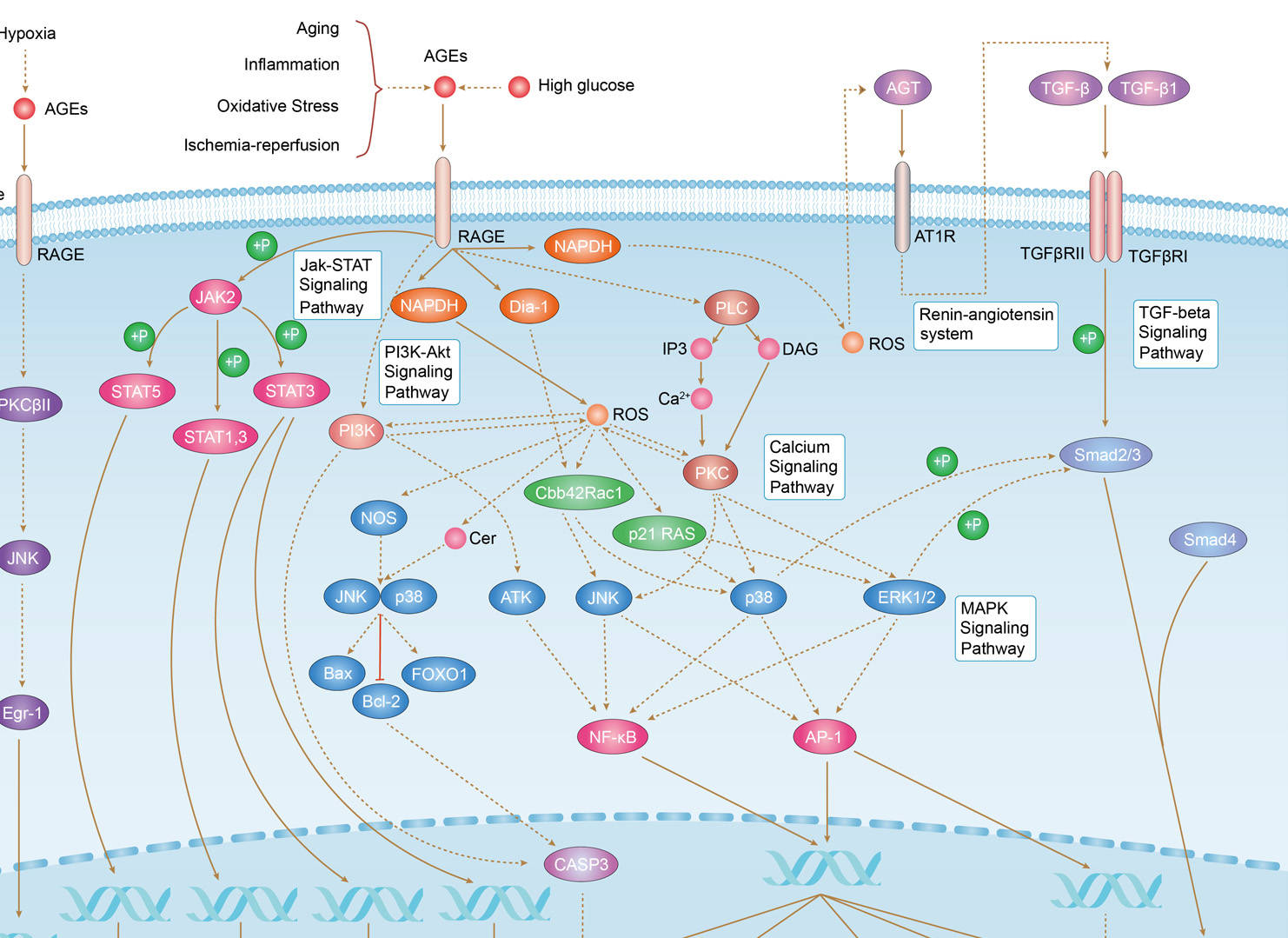 Loading...
Loading...

CDK4
Cancer-related genes, Disease related genes, Enzymes, FDA approved drug targets, Human disease related genes, Metabolic proteins, Plasma proteins
Intracellular
Low cell type specificity
Low immune cell specificity
Group enriched (HBEC3-KT, LHCN-M2, RH-30)
Component of the D-CDK4 complex, composed of CDK4 and some D-type G1 cyclin (CCND1, CCND2 or CCND3). Interacts directly in the complex with CCND1, CCND2 or CCND3. Interacts with SEI1 and ZNF655. Forms a ternary complex, cyclin D-CDK4-CDKN1B, involved in modulating CDK4 enzymatic activity. Interacts directly with CDKN1B (phosphorylated on 'Tyr-88' and 'Tyr-89'); the interaction allows assembly of the cyclin D-CDK4 complex, Thr-172 phosphorylation, nuclear translocation and enhances the cyclin D-CDK4 complex activity. CDK4 activity is either inhibited or enhanced depending on stoichiometry of complex. The non-tyrosine-phosphorylated form of CDKN1B prevents T-loop phosphorylation of CDK4 producing inactive CDK4. Interacts (unphosphorylated form) with CDK2. Also forms ternary complexes with CDKN1A or CDKN2A. Interacts directly with CDKN1A (via its N-terminal); the interaction promotes the assembly of the cyclin D-CDK4 complex, its nuclear translocation and promotes the cyclin D-dependent enzyme activity of CDK4. Interacts with CCND1; the interaction is prevented with the binding of CCND1 to INSM1 during cell cycle progression. Probably forms a complex composed of chaperones HSP90 and HSP70, co-chaperones CDC37, PPP5C, TSC1 and client protein TSC2, CDK4, AKT, RAF1 and NR3C1; this complex does not contain co-chaperones STIP1/HOP and PTGES3/p23 (PubMed:29127155). Interacts with CEBPA (when phosphorylated) (PubMed:15107404). Interacts with FNIP1 and FNIP2 (PubMed:27353360).
Kinase, Serine/threonine-protein kinase, Transferase
- Rabbit Anti-CDK4 Recombinant Antibody (clone CBACN-139) (MRO-0341-CN)
-
- Species Reactivity: Human, Mouse, Rat
- Type: Rabbit IgG
- Application: WB, IF, IP
- Rabbit Anti-CDK4 Recombinant Antibody (clone CBACN-138) (MRO-0340-CN)
-
- Species Reactivity: Human
- Type: Rabbit IgG
- Application: WB, IF, IHC, FC
- Mouse Anti-CDK4 Recombinant Antibody (clone 5-C3-G3) (MRO-0339-CN)
-
- Species Reactivity: Human, Mouse, Rat
- Type: Mouse IgG2c
- Application: WB, IF, IHC
-
- Derivation: Phage display library
- Species Reactivity: Human
- Type: Rabbit IgG
- Application: ICC, IF, WB
-
- Derivation: Mouse
- Species Reactivity: Human
- Type: Mouse IgG
- Application: WB, ICC, IF, IHC
-
- Species Reactivity: Human
- Application: ICC/IF, WB
-
- Species Reactivity: Human, Mouse, Rat
- Type: Mouse IgG
- Application: WB
-
- Species Reactivity: Human, Mouse, Rat, Dog, Pig
- Type: Mouse IgG
- Application: WB
- Anti-CDK4 Recombinant Soluble TCR (UNC-CDK4-1) (scTCR-115ZP-S(P))
-
- Species Reactivity: Human
- Epitope: ALTPVVVTL
- MHC: HLA-A*02:01
-
- Species Reactivity: Human, Mouse, Rat
- Type: Mouse IgG1
- Application: WB, IP, IF
-
- Species Reactivity: Human
- Type: Rabbit IgG
- Application: WB, ICC, IF
-
- Species Reactivity: Human, Mouse
- Type: Rabbit IgG
- Application: WB, ICC, IF, IP
-
- Species Reactivity: Human, Mouse, Rat
- Type: Rabbit IgG
- Application: WB, IHC-F, IHC-P, ICC, IF, IP
- Recombinant Anti-CDK4 Soluble TCR (UNC-CDK4-1) (C-Cys) (VS-0622-YF3593)
-
- Species Reactivity: Human
- Epitope: ALTPVVVTL
- MHC: HLA-A*02:01
- Recombinant Anti-CDK4 Soluble TCR (UNC-CDK4-1) (ZIP-Fos/ZIP-Jun) (VS-0622-YF885)
-
- Species Reactivity: Human
- Epitope: ALTPVVVTL
- MHC: HLA-A*02:01
- Human Anti-CDK4 Recombinant Antibody (clone AK2) (VS-0423-CJ3)
-
- Species Reactivity: Human
- Type: Human IgG
- Application: ELISA, IF
- Mouse Anti-CDK4 Recombinant Antibody (VS4-WK100) (VS4-WK100)
-
- Derivation: Mouse
- Species Reactivity: Human, Rabbit, Pig, Dog, Rat, Mouse
- Type: Mouse IgG1
- Application: ELISA, WB, ICC
-
- Species Reactivity: Human
- Type: Rabbit IgG
- Application: ELISA, WB
-
- Species Reactivity: Human
- Type: Rabbit IgG
- Application: ELISA, WB, IP
-
- Species Reactivity: Human
- Type: Rabbit IgG
- Application: WB, ICC, IF, IHC, FC
Our customer service representatives are available 24 hours a day, from Monday to Sunday. Contact Us
Can't find the products you're looking for? Try to filter in the left sidebar.Filter By Tag
For Research Use Only. Not For Clinical Use.

 Bladder Cancer
Bladder Cancer
 AGE-RAGE Signaling Pathway in Diabetic Complications
AGE-RAGE Signaling Pathway in Diabetic Complications
 p53 Signaling Pathway
p53 Signaling Pathway